Should You Avoid Processed Meat?
Today I am thinking about what foods I want to eat as I just finished my fasting mimicking diet FMD). I’m so happy to be done restricting my food as I Iove eating and I’m looking forward to getting into some more intense working out. My first foods to break my FMD were a smoothie, steel cut oatmeal, and dark chocolate covered almonds! On the FMD you are only eating some nut bars, vegetable soups, olives, and kale crackers. So you are giving up most foods especially tasty ones! But of all the foods you give up when fasting, which ones should you give up just as part of a normal healthy diet? A big one for those interested in maintaining a healthy diet is processed meat. Should you avoid processed meat completely, or is just less of it okay?
What Is Processed Meat?
Processed meat refers to meat that has been treated in some way to preserve or flavor it. Processes include salting, curing, fermenting, and smoking. Examples of processed meat include hot dogs, ham, bacon, sausages, corned beef, beef jerky as well as canned meat and meat-based preparations and sauces.
What Evidence Is There That Should You Avoid Processed Meat?
According to the world health organization (WHO), processed meat is classified as a class 1 carcinogen! That means that there is clear and sufficient evidence that processed meat significantly increases the risk of cancer (1). For a comparison that is that same class 1 category as smoking cigarettes, alcohol, and asbestos exposure! There is a clear association with colorectal cancer and likely stomach cancer. In addition, red meat is classified as a class 2A carcinogen. This means that is it probably a human carcinogen but there is still insufficient evidence to say clearly. This would be in the same category of lead compounds and HPV infection. Red meat is most associated with colorectal cancer (1). This particularly hits home for me as my grandfather died of colorectal cancer when I was a child. He was a huge steak eater. Back then, the media was just starting to think red meat consumption may be associated with it. That lead me to stop eating red meat altogether back in high school and I have continued to do this since that time.
What About Processed Meat Increases Cancer Risks?
The evidence is not clear enough to know the exact factors but here are a few theories:
- Meat has high levels of iron which is associated with increased cancer risks (3).
- Meat can also contain chemicals that form during processing or cooking such as N-nitroso compounds and polycyclic aromatic hydrocarbons that are carcinogens (4). Cooking at high temperatures or directly over an open flame such a barbequing, grilling and pan frying increases the formation of these compounds (5).
- Red meat can shorten the ends of DNA called telomeres which is associated with shorter life span and increased cancer risk (6).
How Much Processed Meat Is Too Much?
According to the American Cancer Society: “Twenty-two experts from 10 countries reviewed more than 800 studies to reach their conclusions. They found that eating 50 grams of processed meat every day increased the risk of colorectal cancer by 18%. That’s the equivalent of about 4 strips of bacon or 1 hot dog” (2). 50 grams equals 1.8 ounces, so even less than 2 ounces of processed meat daily can significantly increase cancer risk, and the more you eat, the higher the risk. For red meat there were increased gastric cancer risks at 100 grams per day which is 3.4oz per day (7).
The Bottom Line
Should you avoid processed meat? Avoid processed meat altogether or only eat sparingly as it increases risk for colorectal cancer and possibly stomach cancer. Red meat should be limited to infrequent intake and small portions for the same reasons. I recommend keeping meat intake to an average of 2 ounces or less per day and have at least 2 meat free days a week. You can also had wild caught fish 2-3 times per week. When choosing meat to eat, select white meat like poultry more often than red meat, and always choose organic grass-fed/pasture-raised meats and poultry.
References
1. https://www.who.int/news-room/questions-and-answers/item/cancer-carcinogenicity-of-the-consumption-of-red-meat-and-processed-meat
2. organic grass-fed/pasture-raised
3. Torti SV, Manz DH, Paul BT, Blanchette-Farra N, Torti FM. Iron and Cancer. Annu Rev Nutr. 2018 Aug 21;38:97-125. doi: 10.1146/annurev-nutr-082117-051732. Review.
4. Molognoni L, Daguer H, Motta GE, Merlo TC, Lindner JD. Interactions of preservatives in meat processing: Formation of carcinogenic compounds, analytical methods, and inhibitory agents. Food Res Int. 2019 Nov;125:108608. doi: 10.1016/j.foodres.2019.108608. Epub 2019 Aug 6. Review.
5. IARC Working Group on the Evaluation of Carcinogenic Risk to Humans. Red Meat and Processed Meat. Lyon (FR): International Agency for Research on Cancer; 2018. https://www.iarc.who.int/wp-content/uploads/2018/07/pr240_E.pdf
6. O’Callaghan NJ, Toden S, Bird AR, Topping DL, Fenech M, Conlon MA. Colonocyte telomere shortening is greater with dietary red meat than white meat and is attenuated by resistant starch. Clin Nutr. 2012 Feb;31(1):60-4. doi: 10.1016/j.clnu.2011.09.003. Epub 2011 Oct 1.
7. Effect of Red, Processed, and White Meat Consumption on the Risk of Gastric Cancer: An Overall and Dose⁻Response Meta-Analysis. Kim SR et al. Nutrients. (2019) Nutrients. 2019 Apr 11;11(4). pii: E826. doi: 10.3390/nu11040826.
